|
|
|
Sort Order |
|
|
|
Items / Page
|
|
|
|
|
|
|
| Srl | Item |
| 1 |
ID:
144697
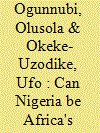

|
|
|
|
|
| Summary/Abstract |
Does the reference to regional hegemony in the African context apply to Nigeria? This study examines this question in line with increasing claims in academic and diplomatic circles of Nigerian hegemony in Africa. While scholars and leading opinion holders have described Nigeria's influence in Africa as typical of a regional hegemon, this paper interrogates the substance of this argument in the context of the nature of the country's foreign policy relations in Africa. Against this background, the article contends that Nigeria actually enjoys a dwindling influence in Africa notwithstanding its current status as Africa's largest economy. The article argues that although Nigeria has never officially harboured any hegemonic aspirations, this hardly disqualifies it from being Africa's hegemonic power. It takes the position that Nigeria remains an important regional power on the continent but is hindered by several factors in playing a hegemonic role. In making this assertion, the article considers a number of conditions that increasingly deflate Nigeria's capacity to play a meaningful hegemonic role in Africa. In doing this, it critically assesses the inherent internal and constraining external conditions that diminish Nigeria's claims to or credentials for effective regional hegemony.
|
|
|
|
|
|
|
|
|
|
|
|
|
|
|
|
| 2 |
ID:
131918
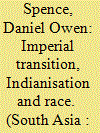

|
|
|
|
|
| Publication |
2014.
|
| Summary/Abstract |
This article examines the colonial legacies in the development of the Indian and Pakistani navies following Independence. As both navies struggled with problems of indigenising their forces, Britain endeavoured to maintain its regional hegemony by extending the professional dependency of both. The influence of imperial ideologies and racial discourses of power on these relationships and on Indian naval identity caused India's and Pakistan's navies to evolve in different directions, as did Cold War geopolitics and civil-military relations. By analysing the challenges faced by India in achieving strategic independence, this article widens existing debates surrounding the neo-colonialism of Indian governance and education during the Nehruvian period, the reinvigoration of Empire and the limits of British imperial power after World War II.
|
|
|
|
|
|
|
|
|
|
|
|
|
|
|
|
| 3 |
ID:
158858
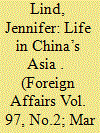

|
|
|
|
|
| Summary/Abstract |
For now, the United States remains the dominant power in East Asia, but China is quickly closing the gap. Although an economic crisis or domestic political turmoil could derail China’s rise [1], if current trends continue, China will before long supplant the United States [2] as the region’s economic, military, and political hegemon.
|
|
|
|
|
|
|
|
|
|
|
|
|
|
|
|
| 4 |
ID:
107378


|
|
|
|
|
| Publication |
2011.
|
| Summary/Abstract |
Judging by their official statements, the establishment of a zone free of weapons of mass destruction (WMD) in the Middle East ranks high on the list of policy priorities of the six member states of the Gulf Cooperation Council (GCC)-Bahrain, Kuwait, Oman, Qatar, Saudi Arabia, and the United Arab Emirates (UAE).[1] As countries bordering a once-proliferating, aggressive state (Iraq); facing another suspected of seeking a nuclear weapons capability and bent on regional hegemony (Iran); and living in the vicinity of nuclear powers outside the nuclear Nonproliferation Treaty (NPT) regime (India, Israel, and Pakistan), they arguably have a paramount security interest in its rapid formation.
|
|
|
|
|
|
|
|
|
|
|
|
|
|
|
|
| 5 |
ID:
100937
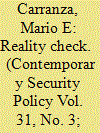

|
|
|
|
|
| Publication |
2010.
|
| Summary/Abstract |
The comparative regional analysis of American foreign policy in the era of unipolarity provides a reality check to the academic debate on American primacy after 11 September. There is disagreement among scholars on whether a liberal or neoimperial logic of global order will emerge in the 21st century, but the debate between supporters and opponents of both logics has largely ignored South America and South Asia. Whether the United States has become the global hegemon cannot be debated in the abstract, or only in relation to the traditional areas of US dominance: Europe and East Asia. Using a neo-Gramscian definition of international hegemony the article argues that the United States exercises flexible and somewhat contested hegemonies in different parts of the world. Brazil's independent foreign policy and great power status pretensions have complicated American attempts to exercise hegemony in South America. In South Asia, India has established a strategic partnership with the United States, but its strong commitment to strategic autonomy and its penchant for an independent foreign policy may become incompatible with post-11 September American grand strategy. The comparative analysis of American policy toward both regions has important implications for international relations theory, showing the need to go beyond realist explanations in order to understand American foreign policy today. The conclusion examines alternative scenarios and policy options for the United States, arguing that a post-11 September new liberal grand bargain can only be established if the United States abandons the drive for global dominance and becomes a 'normal' great power in a genuinely multilateral framework, respecting the rules of the international society of states while listening to other voices in the planet.
|
|
|
|
|
|
|
|
|
|
|
|
|
|
|
|
| 6 |
ID:
134135
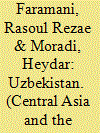

|
|
|
|
|
| Publication |
2014.
|
| Summary/Abstract |
After the collapse of the Soviet Union, the Central Asian states became independent and tried to pursue their foreign policy free from Russian control. Uzbekistan is the only Central Asian state to pursue a proactive and independent foreign policy. Uzbekistan has higher regional power ambitions than the other Central Asian states.
So what is preventing Uzbekistan from fulfilling its dream? It has the necessary subjective and objective prerequisites for this: military potential, a large and fairly homogeneous population, natural resources, favorable geographic location, U.S. support of its secular state, and the willingness of the latter to recognize its regional hegemony. However, the country continues to face several limitations that hinder its leading role. Despite its capabilities, it is not engaging wholeheartedly in regional integration and is hampered by its geographic location, water shortages, structural economic constraints, political problems, and fundamentalism issues.
|
|
|
|
|
|
|
|
|
|
|
|
|
|
|
|
|
|
|
|
|